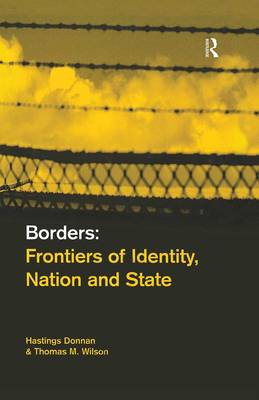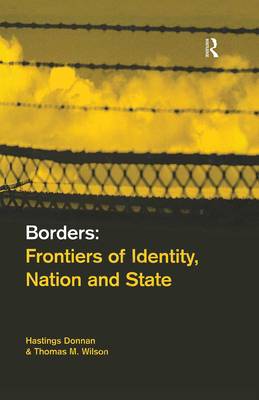
- Retrait gratuit dans votre magasin Club
- 7.000.000 titres dans notre catalogue
- Payer en toute sécurité
- Toujours un magasin près de chez vous
- Retrait gratuit dans votre magasin Club
- 7.000.000 titres dans notre catalogue
- Payer en toute sécurité
- Toujours un magasin près de chez vous
Borders
Frontiers of Identity, Nation and State
Hastings Donnan, Thomas M Wilson
Livre relié | Anglais
182,45 €
+ 364 points
Format
Description
Borders are where wars start, as Primo Levi once wrote. But they are also bridges - that is, sites for ongoing cultural exchange. Anyone studying how nations and states maintain distinct identities while adapting to new ideas and experiences knows that borders provide particularly revealing windows for the analysis of 'self' and 'other'. In representing invisible demarcations between nations and peoples who may have much or very little in common, borders exert a powerful influence and define how people think as well as what they do. Without borders, whether physical or symbolic, nationalism could not exist, nor could borders exist without nationalism. Surprisingly, there have been very few systematic or concerted efforts to review the experiences of nation and state at the local level of borders. Drawing on examples from the US and Mexico, Northern Ireland, Israel and Palestine, Spain and Morocco, as well as various parts of Southeast Asia and Africa, this timely book offers a comparative perspective on culture at state boundaries. The authors examine the role of the state, ethnicity, transnationalism, border symbols, rituals and identity in an effort to understand how nationalism informs attitudes and behaviour at local, national and international levels. Soldiers, customs agents, smugglers, tourists, athletes, shoppers, and prostitutes all provide telling insights into the power relations of everyday life and what these relations say about borders. This overview of the importance of borders to the construction of identity and culture will be an essential text for students and scholars in anthropology, sociology, political science, geography, nationalism and immigration studies.
Spécifications
Parties prenantes
- Auteur(s) :
- Editeur:
Contenu
- Nombre de pages :
- 204
- Langue:
- Anglais
Caractéristiques
- EAN:
- 9781859732410
- Date de parution :
- 01-10-99
- Format:
- Livre relié
- Format numérique:
- Genaaid
- Dimensions :
- 164 mm x 240 mm
- Poids :
- 408 g







